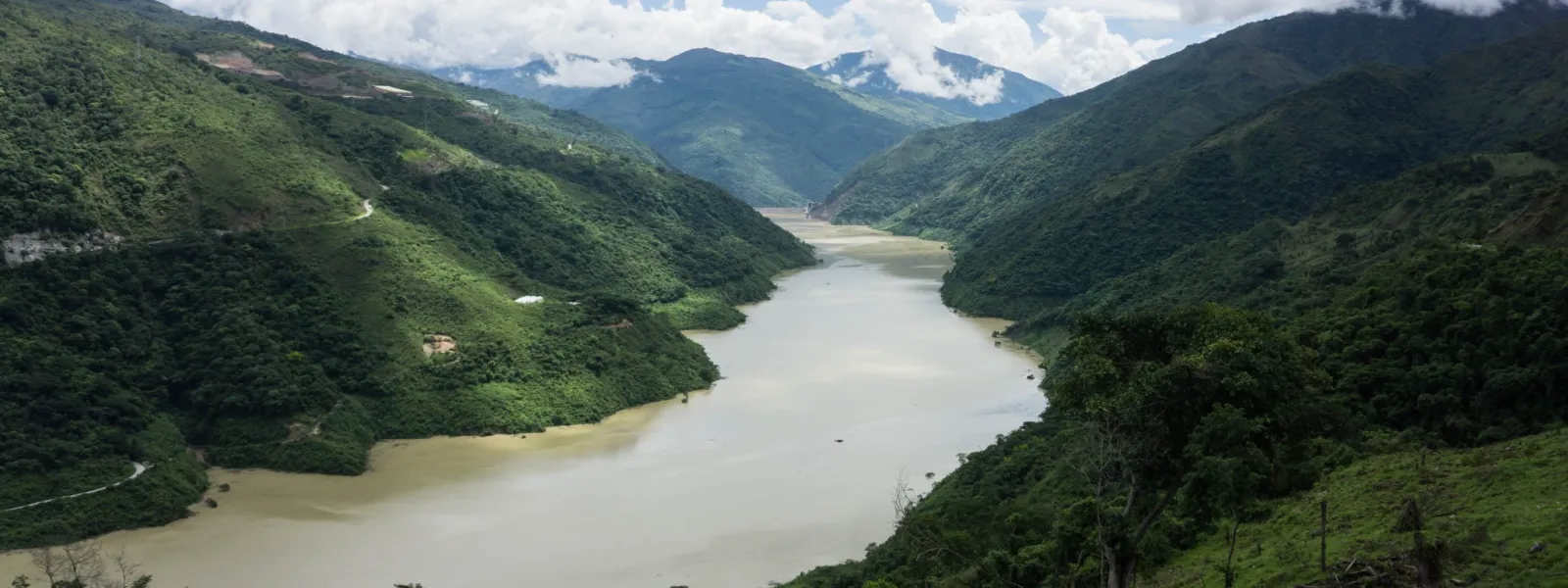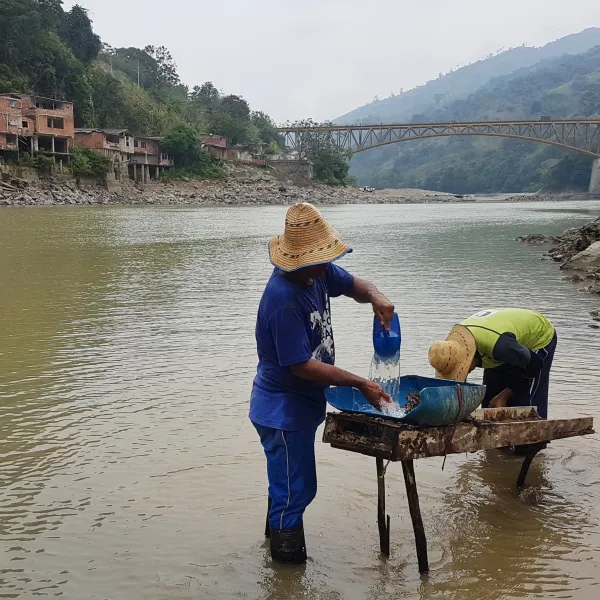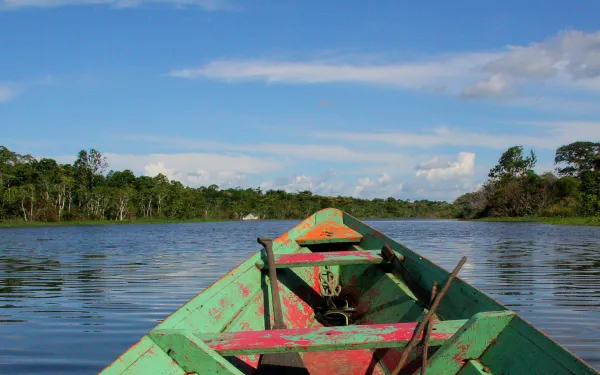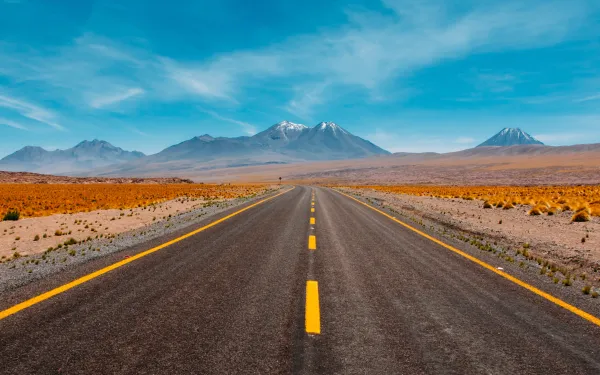
Project
Bram EbusSeeking justice for communities affected by the Hidroituango dam
The Cauca River is the second largest in Colombia. Many of the communities settled throughout its expansive watershed depend on the river for their livelihood, includingd fishing and agriculture.
Winding its way through the Andes mountains, the river courses through seven departments of Colombia, including Antioquia, now home to the Hidroituango Dam—a project that has created an unprecedented humanitarian crisis.
In May of 2018, an error in the dam’s construction caused floods, landslides, avalanches, and the evacuation of more than 25 thousand people. This tragedy exposed the inadequate evaluation of the project’s environmental impacts and the lack of environmental regulation in the dam’s authorization processes.
The project has led to systematic human rights violations, including the disproportionate use of force and an increase in violence against affected communities, who are represented by the Ríos Vivos (“Living Rivers”) Movement of Colombia.
Though construction is not complete, and electricity has not yet been generated, the dam has flooded more than 4,500 hectares of vegetation, releasing a significant amount of methane—a greenhouse gas that aggravates the global climate crisis.
And despite its inadequate implementation, IDB Invest, a private branch of the Inter-American Development Bank, invested millions of dollars into the hydroelectric project and facilitated the investment of billions more from other international banks.
Communities affected by Hidroituango have spent decades denouncing the serious problems caused by the dam, and will not waver in their struggle to defend their land and water.
Partners:

Related projects

Investor Alert: Belo Sun discloses misleading information to investors regarding controversial gold mining project in the Brazilian Amazon
In a complaint to the Ontario Securities Commission, an international coalition of civil society organizations calls attention to the repeated dissemination of misleading information by Belo Sun Mining Corp (TSXV:BSX), including statements by CEO Peter Tagliamonte, downplaying socio-environmental, legal, and financial risks of the company’s “Volta Grande” project along the Xingu River. Canadian-based mining company Belo Sun Corp.(TSXV:BSX) is disseminating misleading and incomplete information to investors about the mining project it is trying to develop on the Xingu river (Volta Grande do Xingu), Pará State, Brazil. This is the central message of a warning letter sent to the Ontario Securities Commission (OSC) on July 29rd by an international coalition of civil society organizations and networks including Amazon Watch, Earthworks, Instituto Socioambiental (ISA), Interamerican Association for Environmental Defense (AIDA), International Rivers, MiningWatch Canada, Movimento Xingu Vivo para Sempre and Rede Xingu+. The OSC is an independent Canadian Crown corporation responsible for protecting shareholders and investors from unfair, improper and fraudulent practices from companies and industries. Drafted by a legal team and supported by independent technical and scientific analysis, the complaint letter challenges recent statements by Belo Sun’s CEO Peter Tagliamonte. In a speech at the Prospectors & Developers Association of Canada (PDAC) event in March 2021, the largest mining convention in the world, Tagliamonte cited the Covid-19 pandemic as the justification for repeated delays in the environmental licencing of the Volta Grande mine, claiming that the mining project was "fully authorized" and that construction was expected to begin at the end of 2021. Similar comments have been made in recent company statements, and by Tagliamonte himself in other occasions. According to the complaint, such declarations are patently false. There are seven public civil actions active in Brazilian courts asking for the suspension of permits and of the licencing process, filed by Federal and State public prosecutors’ and defenders’ offices. These lawsuits focus specifically on irregularities in the Environmental Impact Assessment (EIA), and the lack of free, prior and informed consultation and consent with Indigenous peoples and other traditional communities. The coalition argues that there is overwhelming evidence that Belo Sun breached the Securities Act disclosure requirements, which requires companies to disclose material changes “forthwith” (without delay). Companies must disclose factual and updated data to keep investors well informed. Misleading information disclosed by Belo Sun Mining Corp. According to the complaint, while the company acknowledges the generic risks associated with the licensing process, it fails to disclose the concrete details of the legal actions and suspensions in play regarding its project, relying on investors' lack of knowledge concerning licensing legislation in Brazil. One example refers specifically to the suspension of its construction licence (LI), due to the lack of "free and informed consultation" of Indigenous peoples. In its more recent Corporate Update, Belo Sun states that "it continues to advance financial discussions with various groups in preparation for the commencement of construction following the lifting of the suspension of the construction license (LI)". "The company has not even started a consultation process, - which is now delayed by COVID-19 - and it is already advertising the lifting of the suspension, as if it was just a matter of time", says Marcella Ribeiro, attorney from AIDA's Human Rights and the Environment Program. "The company is not in a position to guarantee the results of the consultation process, as negotiations around consent are time-consuming and will invariably result in major material changes to the project. None of that is being disclosed properly to investors", she adds. Among the risks associated with investments in Belo Sun, the complaint highlights the history of judicial proceedings; conflict around the project; the flaws and gaps in the environmental impact assessment; and the violation of the Indigenous Peoples’ right to prior consultation. The downplaying of environmental and social risks by the company’s studies and impact assessments has sounded the alarm among communities in the Volta Grande region, already affected by the Belo Monte dam. A series of independent technical studies challenge Belo Sun’s statements regarding impacts to water resources, to fauna and flora, and regarding dam safety. The company’s refusal to acknowledge impacts in Indigenous territories along the Xingu river has led to the court decision that suspended the installation licence of the Volta Grande project in 2017 until "free and informed consultation" was carried out. There are also increasing accounts of intimidation and harassment against project opponents, which demonstrate a much more complex and contentious situation as a result of the project than what has been disclosed by the company, the complaint stresses. The coalition concludes that "Belo Sun has failed to fully communicate to current and potential investors about the complex nature of its project" which has a "direct implication for delays, and raises fundamental questions about the project’s viability". The letter delivered to the OSC aims to increase visibility to the many irregularities of the project and to raise awareness among current and potential investors about the major reputational and legal risks attached to the project, at a moment when heightened attention is focused on the Amazon rainforest and its capacity to provide environmental services and mitigate climate change. About Belo Sun’s Volta Grande Project Proposed for development along the Volta Grande (Big Bend), a stretch of the Xingu River (a major tributary of the Amazon) that is one of the most biodiverse locations on the planet, Belo Sun’s project would be the largest open pit gold mine in Brazil. The region is home to indigenous people such as Juruna (Yudjá), Arara, and Xikrin, along other isolated Indigenous and riverside communities. From the outset, Belo Sun has faced numerous lawsuits regarding the Volta Grande Project filed by the Federal Public Prosecutor's Office, the State Public Prosecutor's Office, the State Public Defender's Office, and the Union Public Defender's Office. All of these lawsuits refer to the multiple flaws in its licensing process and in the project’s technical studies. Among other things, the lawsuits seek the cancellation of the company's licences and the suspension of the project's licensing process. One of them resulted in a court decision, still valid, to suspend Belo Sun’s construction licence. press contacts Viviana Herrera, MiningWatch Canada, [email protected] Camila Rossi, Amazon Watch, [email protected] Cecilia Garcia, International Rivers, [email protected] Victor Quintanilla, AIDA, [email protected]
Read more
Litigation to promote (and accelerate) climate action
In 1990, the United Nations Intergovernmental Panel on Climate Change (IPCC) produced its first assessment report. It was the first time that the international scientific community officially and accurately demonstrated that greenhouse gas emissions, produced by human activities, would lead to additional warming of the planet's surface, with global consequences. Over more than two decades of international climate negotiations and agreements to drastically reduce emissions, progress has been slow. And so, climate litigation has become a tool increasingly used by organizations and communities to hold governments and companies accountable for the climate crisis. Legal cases have forced nations to adopt more concrete and ambitious measures to curb emissions and mitigate the human rights impacts of the climate crisis. In May, a Dutch court set a landmark precedent when it ordered multinational oil company Shell to reduce its carbon dioxide emissions by 45 percent over less than 10 years, marking a global environmental victory. "This judgment has been of great significance because Shell is one of the companies that most contributes to climate change," says Verónica Méndez, an attorney with AIDA's Climate Change Program. AIDA's legal and scientific team provides legal support and technical information to organizations and communities initiating climate litigation against governments and companies in Latin America. AIDA also developed a climate litigation platform, which systematizes key information on the cases developed in the region. The mapping of data is being done collaboratively with other organizations and will allow for the strengthening of joint litigation strategies. A brief overview of climate litigation Climate litigation includes cases that raise issues related to the legal obligations that states and companies have in relation to the climate crisis. They are brought before judicial bodies to seek, among other things, the enforcement of existing climate laws; an expansion in the scope of other laws to address climate change; recognition of the relationship between fundamental human rights and the impacts of the climate crisis; and compensation for loss and damage. This, according to a report prepared by the United Nations Environment Programme, in collaboration with the Sabine Center for Climate Change Law at Columbia University (New York), which assesses the global situation of this type of litigation. According to the report, as of July 1, 2020, at least 1,550 climate litigations have been registered in 38 countries, almost doubling the number of cases registered in 24 countries in 2017. The United States leads the list where the most litigation has been filed (1,200), followed by Australia (97), the United Kingdom (58) and the European Union (55). Climate lawsuits are also booming in Latin America, particularly in Mexico, Brazil, Colombia and Chile. To date, AIDA has analyzed nearly 50 cases that will form part of the region's climate litigation platform. Challenges and opportunities in climate litigation While climate litigation seeks to achieve justice for communities affected by the impacts of the climate crisis, one of its great challenges lies the implementation of decisions. In 2018, a historic judgement ruled in favor of 25 young Colombians, who sued the government for deforestation in the Amazon and its direct link to the violation of the right to a healthy environment for future generations. This lawsuit is considered a climate litigation due to the increase in greenhouse gas emissions associated with deforestation. In it, the Supreme Court of Justice recognized the Colombian Amazon as an entity subject to rights and ordered the creation of an action plan to reduce deforestation, and the adoption of an intergenerational pact for the life of the Colombian Amazon. However, the conclusions of follow-up reports on the case indicate that, to date, there has not been full compliance with the ruling. "A judgment does not end with the sentence,” explains Méndez. “It must be followed up with to ensure compliance." Demonstrating that corporations and governments have an enormous responsibility in the fight against the climate crisis not only requires scientific information that proves that the emissions generated or allowed contribute to climate change. It requires linking the facts to human rights to provide more reasons for the courts to act and issue a favorable ruling. "A purely scientific climate change litigation has less chance of success," Méndez emphasizes. "It’s strategic to link a case to direct impacts on the human rights of those people who will be disproportionately affected." According to a report by the Environment and Natural Resources Foundation (FARN), the outlook for climate demands in Latin America is encouraging because governments are making more commitments to climate action and, in addition, climate science is establishing direct links between extreme weather events and climate change. The coming together of communities and environmental organizations is crucial in the movement to accelerate strong policies and actions that will ensure a sustainable, just transformation for both people and the environment. Visit the Climate Litigation Platform for Latin America and the Caribbean
Read more
Litigation to promote (and accelerate) climate action
In 1990, the United Nations Intergovernmental Panel on Climate Change (IPCC) produced its first assessment report. It was the first time that the international scientific community officially and accurately demonstrated that greenhouse gas emissions, produced by human activities, would lead to additional warming of the planet's surface, with global consequences. Over more than two decades of international climate negotiations and agreements to drastically reduce emissions, progress has been slow. And so, climate litigation has become a tool increasingly used by organizations and communities to hold governments and companies accountable for the climate crisis. Legal cases have forced nations to adopt more concrete and ambitious measures to curb emissions and mitigate the human rights impacts of the climate crisis. In May, a Dutch court set a landmark precedent when it ordered multinational oil company Shell to reduce its carbon dioxide emissions by 45 percent over less than 10 years, marking a global environmental victory. "This judgment has been of great significance because Shell is one of the companies that most contributes to climate change," says Verónica Méndez, an attorney with AIDA's Climate Change Program. AIDA's legal and scientific team provides legal support and technical information to organizations and communities initiating climate litigation against governments and companies in Latin America. AIDA also developed a climate litigation platform, which systematizes key information on the cases developed in the region. The mapping of data is being done collaboratively with other organizations and will allow for the strengthening of joint litigation strategies. A brief overview of climate litigation Climate litigation includes cases that raise issues related to the legal obligations that states and companies have in relation to the climate crisis. They are brought before judicial bodies to seek, among other things, the enforcement of existing climate laws; an expansion in the scope of other laws to address climate change; recognition of the relationship between fundamental human rights and the impacts of the climate crisis; and compensation for loss and damage. This, according to a report prepared by the United Nations Environment Programme, in collaboration with the Sabine Center for Climate Change Law at Columbia University (New York), which assesses the global situation of this type of litigation. According to the report, as of July 1, 2020, at least 1,550 climate litigations have been registered in 38 countries, almost doubling the number of cases registered in 24 countries in 2017. The United States leads the list where the most litigation has been filed (1,200), followed by Australia (97), the United Kingdom (58) and the European Union (55). Climate lawsuits are also booming in Latin America, particularly in Mexico, Brazil, Colombia and Chile. To date, AIDA has analyzed nearly 50 cases that will form part of the region's climate litigation platform. Challenges and opportunities in climate litigation While climate litigation seeks to achieve justice for communities affected by the impacts of the climate crisis, one of its great challenges lies the implementation of decisions. In 2018, a historic judgement ruled in favor of 25 young Colombians, who sued the government for deforestation in the Amazon and its direct link to the violation of the right to a healthy environment for future generations. This lawsuit is considered a climate litigation due to the increase in greenhouse gas emissions associated with deforestation. In it, the Supreme Court of Justice recognized the Colombian Amazon as an entity subject to rights and ordered the creation of an action plan to reduce deforestation, and the adoption of an intergenerational pact for the life of the Colombian Amazon. However, the conclusions of follow-up reports on the case indicate that, to date, there has not been full compliance with the ruling. "A judgment does not end with the sentence,” explains Méndez. “It must be followed up with to ensure compliance." Demonstrating that corporations and governments have an enormous responsibility in the fight against the climate crisis not only requires scientific information that proves that the emissions generated or allowed contribute to climate change. It requires linking the facts to human rights to provide more reasons for the courts to act and issue a favorable ruling. "A purely scientific climate change litigation has less chance of success," Méndez emphasizes. "It’s strategic to link a case to direct impacts on the human rights of those people who will be disproportionately affected." According to a report by the Environment and Natural Resources Foundation (FARN), the outlook for climate demands in Latin America is encouraging because governments are making more commitments to climate action and, in addition, climate science is establishing direct links between extreme weather events and climate change. The coming together of communities and environmental organizations is crucial in the movement to accelerate strong policies and actions that will ensure a sustainable, just transformation for both people and the environment. Visit the Climate Litigation Platform for Latin America and the Caribbean
Read more